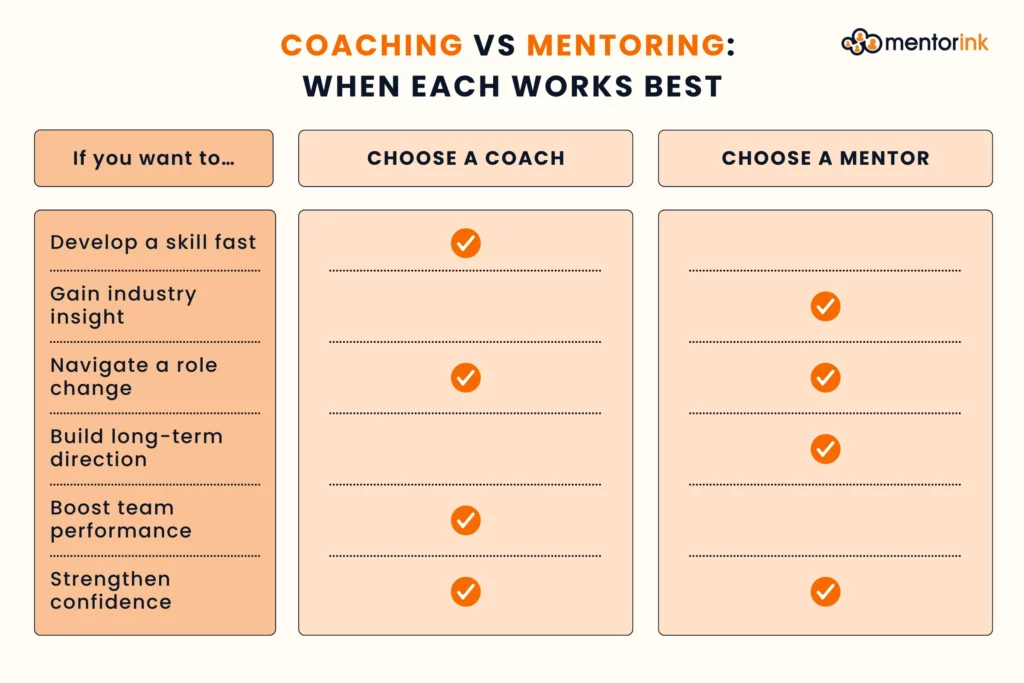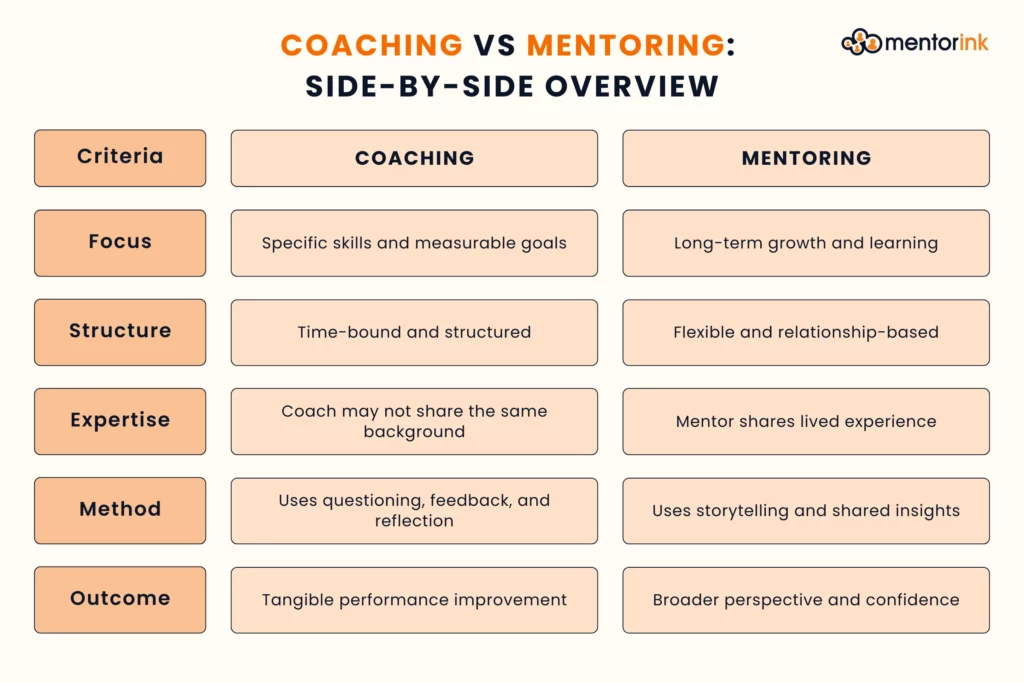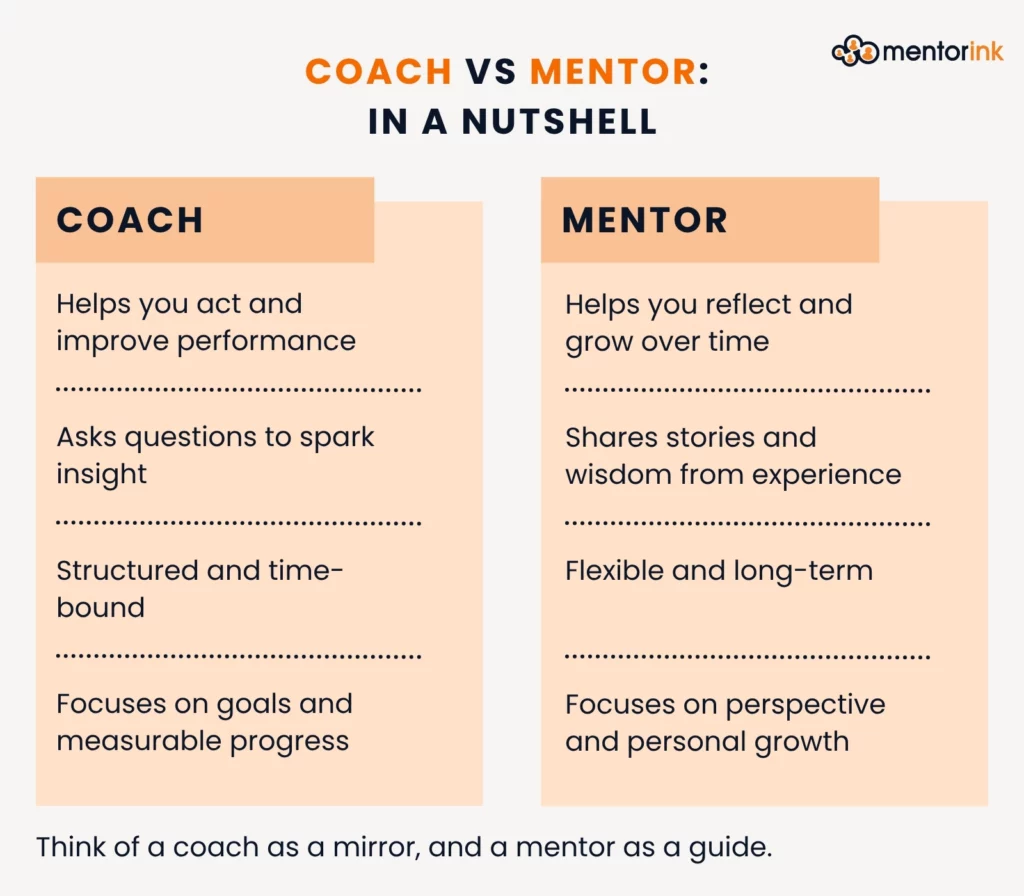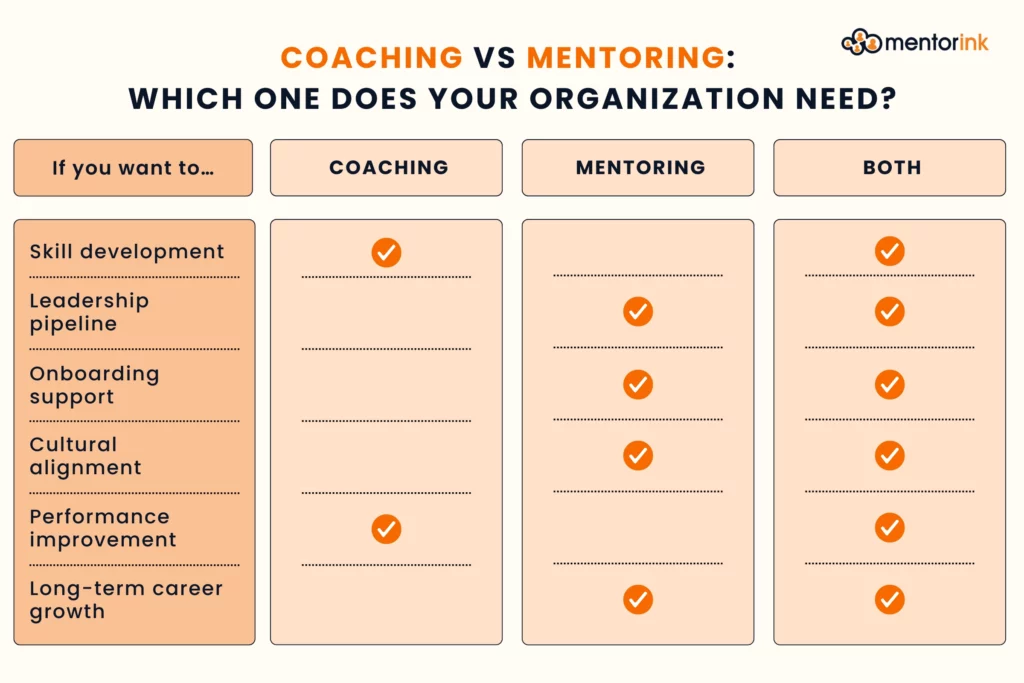
You’re looking for someone to guide you, to help you grow, find direction, and make meaningful progress in what you do. But who should that person be? A coach or a mentor?
It’s easy to confuse the two. Both coaching and mentoring offer support, motivation, and a safe space to grow. Yet they take different routes to get there. Coaching focuses on structured development and measurable progress, while mentoring builds on shared experiences and long-term learning.
Choosing between them isn’t always straightforward. Understanding how each works, and how they can work together, will help you make the right choice for yourself or your organization. In this article, you’ll explore what coaching and mentoring really mean, how they differ, and when each one makes the biggest impact.
Both roles aim to unlock potential but in different ways. Let’s begin with coaching, where the focus is on structure, accountability, and measurable progress.
What is Coaching?
You’ve probably heard the saying, “Give a person a fish and you feed them for a day; teach them to fish and you feed them for a lifetime.” That’s the essence of coaching, it’s not about giving answers, but helping people discover their own.
Coaching is a guided and structured process that helps individuals set clear goals, reflect on their actions, and make lasting progress. The International Coaching Federation (ICF) defines it as “partnering with clients in a thought-provoking and creative process that inspires them to maximize their personal and professional potential.” In simpler words, it’s about unlocking what’s already inside you with the right guidance and support.
From developing leadership skills to managing transitions or improving performance, coaching adapts to many goals. It’s practical, forward-looking, and focused on growth in the here and now.
So what does this look like in real life? That’s where the coach comes in.
What is a Coach?
There’s a reason we call them coaches. Just like in sports, a good coach doesn’t play the game for you; they stand on the sidelines, observing, guiding, and helping you see what you might miss.
In professional settings, a coach takes on a similar role, providing structure, clarity, and encouragement to help individuals or teams reach their goals. A coach is a trained professional who supports people in identifying challenges, staying accountable, and realizing their potential through guided reflection and action. Their focus is on progress, what can be improved, what might be holding you back, and what steps will move you forward.
Whether through executive, performance, or life coaching, their goal is to help people make measurable progress by turning insight into action.

The real value of coaching lies not in giving directions, but in helping others think differently, recognize patterns, and take ownership of their growth.
Unlike mentors or consultants, coaches don’t rely on personal experience or offer ready-made answers. They create the conditions for self-discovery, helping individuals uncover their strengths and translate awareness into meaningful, lasting change, one conversation at a time.
What skills are required for coaching?
Good coaching doesn’t happen by accident. It takes a blend of people skills, emotional awareness, and the ability to turn conversations into meaningful progress. The best coaches balance empathy with structure, asking the right questions while keeping their clients focused on growth and action.
Here are some of the skills that make coaching truly effective:
- Active listening: Paying close attention to words, tone, and emotions to understand the full message behind what’s being said.
- Empathy: Creating a safe, supportive space where people feel understood and encouraged.
- Clear communication: Framing ideas and feedback in a way that inspires clarity and confidence.
- Adaptability: Recognizing that no two people grow the same way, and adjusting methods accordingly.
- Goal-setting: Helping clients define realistic objectives and stay accountable throughout the journey.
- Problem-solving: Guiding clients to identify barriers and discover practical ways to move forward.
- Constructive feedback: Offering insights that challenge comfort zones while building motivation.
- Patience and presence: Understanding that meaningful change takes time, and real progress isn’t always linear.
Great coaches don’t follow a formula; they read the moment, listen deeply, and adapt their approach to what each person needs most. That’s what turns a simple conversation into lasting development.
Each person holds so much power within themselves that needs to be let out. Sometimes they just need a little nudge, a little direction, a little support, a little coaching, and the greatest things can happen.
Pete Carroll
When to seek out a coach
There’s no rulebook for when to work with a coach, but there are moments when it just makes sense. Maybe you’ve hit a wall, you’re stuck in the same routine, or you simply want to grow faster and smarter. That’s usually where coaching steps in.
You might consider working with a coach when you want to:
- Develop a specific skill: Whether it’s public speaking, time management, or leadership, a coach helps you sharpen your abilities through feedback and practice.
- Boost performance: If you’re aiming to do better at work – close more deals, lead more effectively, or manage your projects with ease – a coach can help you identify what’s holding you back.
- Set and achieve goals: When you have a vision but no roadmap, a coach brings structure, accountability, and the tools to turn goals into results.
- Manage stress or prevent burnout: Coaches can help you regain focus, balance your workload, and build habits that support well-being.
- Navigate transitions: Whether you’re stepping into a new role, switching industries, or preparing for leadership, a coach helps you adapt and stay confident through change.
Coaching can be especially valuable when your own strategies stop working or you need a fresh, objective perspective. A skilled coach gives you structure, focus, and honest reflection, the kind of clarity that leads to measurable progress.
And the results? Often more than just professional wins. Many people find coaching helps them reduce stress, feel more energized, and reconnect with what motivates them, benefits that ripple far beyond their job titles.
Coaching helps you find answers within yourself. But sometimes, what you really need is someone who has walked the path before you. That’s where mentoring comes in.
What is Mentoring?
If coaching is about asking the right questions, mentoring is about sharing the right stories. A mentor is someone who’s been there before, someone who offers guidance, perspective, and encouragement drawn from real experience.
Mentoring is a developmental relationship built on trust and genuine connection. While coaching often focuses on short-term, structured goals, mentoring takes a longer view. It’s less about immediate performance and more about helping someone grow through reflection, shared insight, and honest conversation.
A mentor doesn’t give instructions or impose targets. Instead, they share lessons learned, offer perspective when things get unclear, and help mentees see the bigger picture of where they’re heading. It’s a process shaped by empathy, curiosity, and the willingness to learn together, not a checklist, but a relationship that evolves over time.
Now let’s look at who takes on this role and what makes someone a great mentor.
What is a Mentor?
A mentor is someone who’s walked the path before and is willing to guide others along it. They’re not there to lead the way, but to walk beside you, sharing lessons, offering perspective, and helping you see options you might not have considered.
Unlike coaches, mentors often draw on their own experiences. They share what worked, what didn’t, and how they overcame similar challenges. Their value lies not in giving direct answers, but in helping you learn from their stories and apply that wisdom in your own way.
A good mentor balances honesty with encouragement. They listen, ask questions that spark reflection, and sometimes tell you the things you need to hear, not just what you want to. The best mentors don’t shape people into copies of themselves, they help others grow into their own potential.

What skills are required for mentoring?
Mentoring is as much about connection as it is about guidance. It’s built on trust, patience, and the ability to see potential in someone even before they see it themselves. While a coach focuses on performance, a mentor focuses on perspective, helping others grow through experience, encouragement, and shared understanding.
Some of the qualities that make a great mentor include:
- Experience and perspective: Drawing on real-life lessons to help mentees see different paths forward.
- Storytelling: Knowing when to share a personal story that brings clarity or reassurance.
- Empathetic understanding: Reading between the lines, sensing doubts, and offering support with care.
- Guidance, not control: Giving direction when needed but allowing mentees to make their own choices.
- Constructive honesty: Offering feedback that’s kind, realistic, and rooted in growth.
- Reliability: Being consistent and showing up, mentorship works best when it feels safe and dependable.
- Encouragement and patience: Believing in your mentee’s potential, even when they doubt themselves.
In mentoring, wisdom isn’t about telling people what to do, it’s about sharing what you’ve learned in a way that helps them shape their own path.
When to seek out a mentor
Mentorship isn’t something you wake up one morning and decide to pursue, it usually finds you when you’re standing at a crossroads. Maybe you’re facing a big decision, stepping into a new phase, or simply looking for someone who’s been where you want to go. That’s when a mentor can make all the difference.
You might seek out a mentor when you want to:
- Find direction: If you’re exploring new career paths or trying to understand what’s next, a mentor’s experience can help you see possibilities more clearly.
- Grow over time: When you’re focused on steady, long-term development rather than quick wins, mentoring provides guidance that evolves with you.
- Build confidence and perspective: Mentors help you reframe challenges and see your potential from a new angle.
- Learn from experience: When you’d benefit from real-world stories, lessons, and advice that textbooks can’t offer.
- Expand your network: Mentors can introduce you to new opportunities, people, and ways of thinking that open unexpected doors.
Unlike coaching, which focuses on short-term performance goals, mentoring supports lifelong growth. It’s not about fixing problems, it’s about shaping perspectives. A good mentor doesn’t walk ahead of you or behind you, but right beside you, reminding you that the journey is just as important as the destination.
While coaching and mentoring have distinct focuses, the line between them can naturally blur. The best development journeys often combine both.
Can a coach be a mentor?
Sometimes, yes. The lines between coaching and mentoring can blur, and that’s perfectly natural. A great coach might slip into a mentoring moment when their own experience adds value, and a mentor might use coaching techniques to help someone think things through.

The difference lies in how they guide. Coaches focus on asking the right questions to spark reflection and action. Mentors share lessons from their own journey to offer perspective and encouragement. When combined thoughtfully, the two can complement each other beautifully, turning guidance into genuine growth.
Coaching vs Mentoring: What’s the Difference and Why It Matters
If you’ve ever wondered what is coaching vs mentoring, you’re not alone. The two terms are often used interchangeably in the workplace, in leadership development, and even in education, but they’re not the same thing.

Both coaching and mentoring aim to help people grow, yet they take very different routes to get there. Coaching is about structured, short-term progress, while mentoring focuses on long-term learning and connection. Together, they form a powerful foundation for professional and personal growth.
Coaching vs Mentoring: Key Differences
1. Purpose and Focus
Coaching is performance-driven, designed to improve specific skills or achieve measurable outcomes. It’s common in areas like career coaching, business coaching, or leadership coaching, where you want targeted improvement and accountability.
Mentoring is development-driven. It’s about sharing wisdom, building confidence, and helping someone see their path more clearly. Mentors act as long-term guides, not instructors.
2. Structure and Duration
A coaching relationship is time-bound and structured, often lasting weeks or months, with regular sessions and clear goals.
Mentoring is usually long-term and flexible, built on trust and organic conversations that evolve over time.
3. Expertise and Role
A coach doesn’t need to have direct experience in your field. They use frameworks, tools, and questioning techniques to help you reflect and act.
A mentor, however, draws on their own background, sharing experiences, lessons, and practical advice from a place of familiarity.
4. Method and Approach
Coaching uses strategic questioning, reflection, and feedback to drive behavior change.
Mentoring leans on storytelling, dialogue, and shared experiences to offer perspective and insight.
5. Outcome and Impact
Coaching leads to specific, measurable improvement, stronger performance, new habits, or refined skills.
Mentoring creates broader, long-lasting growth, expanded vision, deeper understanding, and personal transformation.
Now that we’ve seen how coaching and mentoring differ, it helps to understand how they fit within other development methods such as training and counseling.
Coaching vs Mentoring vs Training vs Counseling
In professional development, these terms often overlap but serve different purposes:
- Coaching helps people reach specific performance goals.
- Mentoring builds long-term relationships for personal and professional growth.
- Training focuses on teaching new skills or knowledge through structured learning.
- Counseling supports emotional well-being and personal challenges that may affect work or life balance.

Each plays a distinct role in helping people and organizations grow. In the workplace, a mix of mentoring, coaching, and training creates a complete learning ecosystem, one that helps employees not just perform better, but thrive.
Coaching vs Mentoring in Organizations
Coaching and mentoring both help people learn and grow, but how they’re used can look very different across workplaces, NGOs, and universities. The context shapes the purpose.
Coaching In the Workplace
In a corporate or business setting, coaching is often used to boost performance and develop leadership skills. It’s structured, measurable, and designed to help employees hit specific goals, like improving communication, managing teams, or adapting to new roles.
Mentoring, on the other hand, focuses on career development and long-term growth. It connects experienced professionals with younger talent to share insights, navigate challenges, and build confidence. Together, coaching and mentoring in the workplace create a powerful balance between performance and perspective.
Coaching In NGOs and Nonprofits
In NGOs, mentoring is often about building capability and resilience in teams working under pressure. Experienced mentors help newer staff handle complex social, cultural, and emotional challenges that come with mission-driven work.
Coaching, meanwhile, is increasingly used by NGO leaders to strengthen management, collaboration, and cross-cultural communication. When budgets are tight and stakes are high, coaching provides structure and accountability, while mentoring offers empathy and shared wisdom.
Coaching In Education
In universities, mentoring has always been part of academic culture, between professors and students, senior and junior researchers, or peer-to-peer. It supports long-term academic and personal development.
Coaching in education complements this by offering short-term, goal-focused guidance. Academic or career coaches help students set goals, manage time, and stay motivated. Many universities now combine both: coaching for clarity and structure, mentoring for connection and direction.
In any environment – corporate, nonprofit, or academic – coaching and mentoring work best together. Coaching helps people act with purpose. Mentoring helps them understand why that purpose matters.
Across all these environments, one truth remains: both coaches and mentors guide growth in their own unique way.
Coach vs Mentor: Different Roles, Shared Purpose
Both coaches and mentors guide growth, just in different ways. Here’s how they compare when you look at the experience from a personal perspective:
- A coach helps you act.
They guide you toward specific goals, break down barriers, and hold you accountable. Coaching sessions feel structured, goal-focused, and results-oriented.
- A mentor helps you reflect.
They share lessons from their own experiences, helping you see the bigger picture and build confidence over time.
- Coaches challenge your mindset.
They ask powerful questions, spark self-discovery, and help you develop new habits that drive performance.
- Mentors share perspective.
They draw from real stories – the wins, mistakes, and lessons – that offer insight no textbook could teach.
- Coaching feels like a sprint.
You’re focused, measured, and guided every step of the way.
- Mentoring feels like a journey.
It’s flexible, long-term, and evolves as you grow, built on trust, empathy, and shared learning.
In short:
- Coaching sharpens your skills.
- Mentoring shapes your outlook.
Instead of choosing one over the other, the most powerful results come when the two work hand in hand.

When a coach and mentor can work together
Coaching and mentoring don’t have to be a choice. Together, they create a balanced approach that combines structure with empathy, short-term results with long-term growth.
Here are some situations where the two can work side by side:
- Career transitions
A mentor can share industry insights and help you see the bigger picture, while a coach sharpens specific skills you’ll need in your new role. - Leadership and entrepreneurship
Mentors share lessons from experience, helping you understand the human side of leadership. Coaches focus on strengthening communication, confidence, and decision-making. - Holistic development
Coaching offers clear goals and accountability, while mentoring adds perspective and wisdom. Together, they support both skill-building and personal growth. - Work-life balance
A mentor helps you manage big-picture priorities. A coach helps you develop habits that reduce stress and improve focus day by day. - Goal setting and accountability
A coach helps you plan and stay on track. A mentor reminds you why those goals matter and how they connect to your larger purpose. - Building networks
Mentors introduce you to opportunities and people. Coaches help you build the confidence and communication skills to nurture those connections.
When these two forms of guidance work together, you get the best of both worlds: a coach to help you take action, and a mentor to help you make meaning out of every step.
Despite their differences, coaching and mentoring share the same foundation of trust, growth, and human connection.
Similarities Between Coaching vs Mentoring
Even though coaching and mentoring take different routes, they share the same destination: helping people grow. Both are built on human connection, trust, and the belief that everyone can reach their potential with the right kind of support.
- Shared Purpose
Both coaching and mentoring aim to help people learn, reflect, and progress toward personal or professional goals. Whether it’s improving a skill or navigating a big decision, both create space for growth and self-discovery.
- Trust and Confidentiality
At the heart of both relationships is trust. Coaches and mentors create a safe, private space where people can speak honestly about challenges, ambitions, and doubts without fear of judgment.
- Active Listening and Empathy
Both roles rely on deep listening and genuine empathy. They’re not about quick advice but about understanding what really matters and helping people find their own answers.
- Constructive Feedback and Reflection
In both coaching and mentoring, feedback is a tool for insight, not criticism. Reflection turns that feedback into awareness, helping individuals see their patterns, strengths, and areas for improvement.
- Relationship and Respect
Both require a partnership based on mutual respect. The process works best when both sides show up with openness, curiosity, and a shared commitment to learning.
- Communication and Confidence
Regular conversations with a mentor or coach naturally strengthen communication and self-expression. Over time, this builds confidence, clarity, and a greater ability to connect with others.
- Support Through Transitions
Both mentoring and coaching are especially powerful during times of change, starting a new role, leading a new team, or redefining a career path. They help people navigate uncertainty with purpose and confidence.
In short, while coaching focuses on performance and mentoring focuses on perspective, both rely on trust, empathy, and meaningful conversation to unlock potential and spark growth.
Understanding these similarities makes it easier to see how each approach serves your organization’s goals.
Coaching vs Mentoring: Which One Does Your Organization Need?
When it comes to employee development, it’s not always about choosing between coaching and mentoring. The most successful organizations often use both, combining the structure of coaching with the connection of mentoring to create a culture of continuous learning.
Here’s a quick way to decide what your team might need most right now:
Choose Coaching if your goal is to…
- Improve performance or productivity in a measurable way
- Develop specific skills like leadership, communication, or time management
- Support employees through change or new responsibilities
- Build confidence and accountability with short-term focus
Choose Mentoring if your goal is to…
- Foster long-term growth and career development
- Build a culture of knowledge-sharing and inclusion
- Support onboarding, leadership pipelines, or succession planning
- Strengthen engagement, trust, and cross-team relationships
Combine Both if your goal is to…
- Create a holistic talent development strategy
- Support both immediate skill-building and long-term growth
- Balance structure (coaching) with empathy and connection (mentoring)
- Build resilient, motivated, and future-ready teams

Whether you choose one, the other, or both, having the right platform turns ideas into measurable impact.
Making It Work with Mentorink
Whether you’re building a coaching program, launching a mentoring initiative, or designing both under one umbrella, Mentorink helps you do it seamlessly.
With Mentorink’s platform, you can:
- Match the right people through smart pairing algorithms
- Track progress, engagement, and outcomes with measurable insights
- Support hybrid, NGO, or university-based programs just as easily as corporate ones
- Create scalable, people-centered development programs that truly make an impact
Coaching helps people perform better. Mentoring helps them become better.
With Mentorink, your organization can do both – across multiple programs, audiences, and goals – all in one seamless platform.
At the end of the day, both approaches serve a shared purpose: helping people grow with the right support.

Key Takeaway
Coaching and mentoring aren’t competitors, they’re partners in growth. Coaching gives people focus, accountability, and measurable progress. Mentoring offers guidance, connection, and long-term perspective.
When used together, they build stronger leaders, more confident teams, and workplaces that keep learning.
Whether you’re in a company, university, or NGO, choosing the right mix starts with understanding your people’s needs, and giving them the support that helps them grow.
With Mentorink, it’s easy to bring both together under one roof.
From tailored matching to measurable outcomes, Mentorink helps you turn coaching and mentoring into lasting impact.
Because true growth happens when the guidance fits you, not the other way around.


